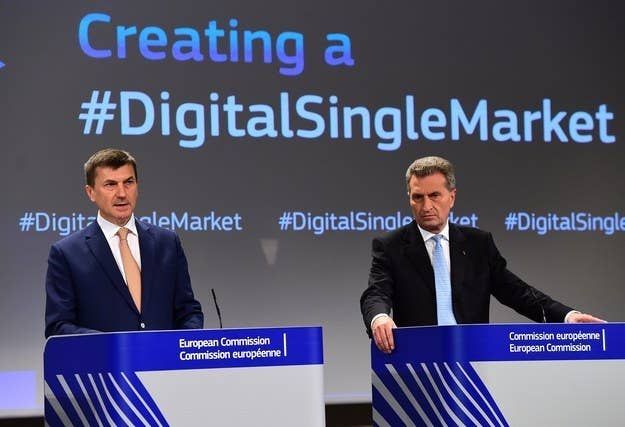
The executive arm of the European Union today unveiled a comprehensive set of initiatives to create a "digital single market," a pan-European economy to foster international trade of IT and web services, which officials estimate will contribute 415 billion euros to the EU. As an extension of the EU's decades-long project to unify the patchwork of member-state economies, the digital single market aims to replace the regulatory regime of 28 national markets with just one.
The announcement comes amid increased regulatory scrutiny of U.S. technology companies by European authorities. Last month, the EU's antitrust chief brought charges against Google for favoring its own products. Officials are examining the tax arrangements of Apple and Amazon. And Facebook faces several privacy probes. That's led to suggestions from some critics that the EU wishes to erect a protectionist blockade, a regulatory construct that will stifle investment.
Speaking at an event hosted by the Atlantic Council, a think tank focused on international affairs, EU Ambassador to the United States David O'Sullivan addressed concerns as he explained that the digital single market calls for increased transparency and accountability. "This will not always mean that we will regulate," he said. "But we must not be naive. There are times when regulation is necessary in order to make markets function effectively."
The 16 initiatives that compose the DSM, which the European Commission hopes to deliver by the end of 2016, will offer consumers and business better access to digital goods and services. The digital single market will also initiate a review of rules governing telecoms, media companies, online platforms, and privacy issues spawned by the mass collection of personal data.
"Today, we lay the groundwork for Europe's digital future. I want to see pan-continental telecom networks, digital services that cross borders, and a wave of innovative European start-ups," said European Commission President Jean-Claude Juncker.
Ambassador O'Sullivan called the announcement "transformative."
"The idea is to develop simple and effective cross-border rules for consumers and business, attacking unjustified online geo-blocking practices, reforming our copyright regime, and reducing administrative burdens," Ambassador O'Sullivan said.
Speaking at the same event, a U.S. Commerce Department official, Marcus Jadotte, said, "We recognize the opportunity both for European consumers, for European companies, and for American companies who do business in Europe."
"On the concerning end, we have certainly heard voices in Europe," he said, "that lead both the Commerce Department and U.S. industry to be concerned, but we look forward to working with the ambassador, obviously, and the EU more generally, ensuring that the digital single market concept becomes the basis for expanded trade."
Jadotte went on to praise the openness of the European market and the economic importance of transatlantic trade, emphasizing the opportunity for the US-E.U. partnership to establish norms in the digital marketplace.
"Our economies and societies are going digital. Future prosperity will depend largely on how well we master this transition," Commissioner for the Digital Economy and Society Gunther H. Oettinger said.
One of the 16 proposals is of special concern to American tech companies.
Under the policy goal of establishing a level playing field, the European Commission would "comprehensively analyze the role of online platforms (search engines, social media, app stores, etc.) in the market." In addition to tackling illegal content, this specific proposal would address controversial business practices that aren't already covered by competition law. These include the lack of transparency in how internet search results are generated, web pricing policies, deals between platforms and suppliers, how consumer data is put to use, and the ways in which internet companies unfairly promote their own services over those of rivals.
Early tech company reactions to the digital single market were cautious and diplomatic.
A Facebook spokesperson told BuzzFeed News: "We are supportive of legislation which moves us closer to a true European digital single market without limiting innovation and growth. We will assess the proposals individually as they are published."
Amazon, in a statement to BuzzFeed News, said, "We agree with the vision of Europe as a single market and look forward to working with the Commission."
When BuzzFeed News asked Ambassador O'Sullivan to elaborate on the scrutiny directed toward U.S. tech companies in Europe, he said the assessment of online platforms would more directly affect American companies — not because they are from the U.S., but rather due to their very strong presence in the platforms business.
Last week, in an op-ed published by Wired, Ambassador O'Sullivan made that same argument more broadly, pushing back against a Silicon Valley narrative that pits Europe's old-world regulation against America's new-world data innovation. He insisted that characterization isn't accurate.
From the perspective of the European Commission, the digital single market's main purpose is to make trade with Europe easier, and to promote economic growth.
Plans for the digital single market may take years to execute. The road map will first be discussed in the European Parliament. The European Commission will then take up each of the 16 initiatives.
"There will be some disagreements," Ambassador O'Sullivan said. "But I am absolutely confident that we will find the right solutions in Europe under the leadership of the commission."
